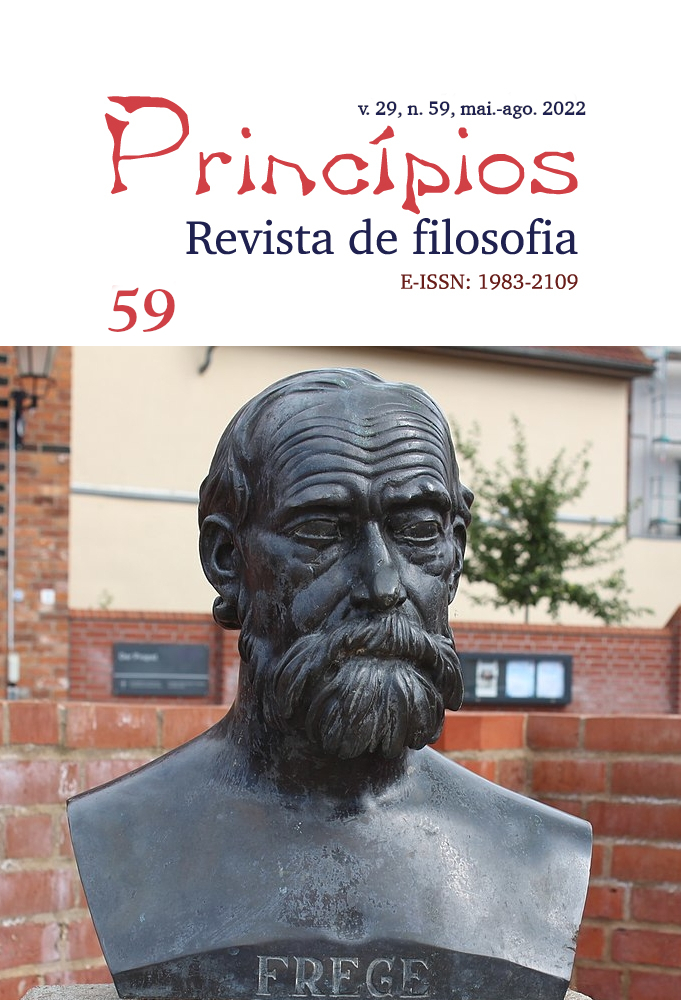Aprimoramento das práticas punitivas e prevenção distal do crime: Uma alternativa ao ceticismo sobre a responsabilidade moral
DOI:
https://doi.org/10.21680/1983-2109.2022v29n59ID27258Palabras clave:
responsabilidade moral, ceticismo, punição, reforma penalResumen
Em décadas recentes, a investigação filosófica sobre a responsabilidade moral e o livre-arbítrio, que por muito tempo foi vista como um empreendimento em grande medida teórico, passou a também incluir preocupações de tipo mais prático. Essa mudança é bem ilustrada pela proposta cética desenvolvida por autores como Derk Pereboom e Gregg Caruso. Seus trabalhos buscam não apenas defender a tese de que não somos agentes livres e moralmente responsáveis (em um sentido delimitado dos termos), mas também advogar em favor de reformas na maneira como a responsabilização é efetivada em nossas relações interpessoais e, especialmente, no sistema penal. Este artigo examina as implicações práticas do ceticismo de Pereboom e Caruso, especialmente no que diz respeito à sua implementabilidade. Argumento que o núcleo propriamente cético da proposta é inviável para seres humanos com a psicologia moral que temos, mas que, apesar disso, alguns elementos da proposta são compatíveis com uma proposta não-cética focada no aperfeiçoamento das práticas punitivas.
Descargas
Citas
Brasil. Decreto-lei no 2.848, de 7 de dezembro de 1940. Rio de Janeiro, 1940. Disponível em: <http://www.planalto.gov.br/ccivil_03/decreto-lei/Del2848compilado.htm>. Acesso em: 21 jan 2018.
Brasil. Lei no 11.343, de 23 de agosto de 2006. Brasília, 2006. Disponível em: <http://www.planalto.gov.br/ccivil_03/_Ato2004-2006/2006/Lei/L11343.htm>. Acesso em: 21 jan 2018.
Brasil. Lei no 13.104 de 9 de março de 2015. Brasília, 2015. Disponível em: <http://www.planalto.gov.br/CCIVIL_03/_Ato2015-2018/2015/Lei/L13104.htm>. Acesso em: 21 jan 2019.
BROOKS, Thom. Punishment. London: Routledge, 2012.
Caruso, Gregg D. Free will skepticism and criminal behavior: A public health-quarantine model. Southwest Philosophy Review, v. 32, n. 1, p. 25–48, 2016.
Caruso, Gregg D. e Pereboom, Derk. A non-punitive alternative to retibutive punishment. FOCQUAERT, F.; WALLER, B.; SHAW, E. (Org.). Routledge handbook of the philosophy and science of punishment. Routledge, 2020.
CLARK, Cory J. e colab. Free to punish: A motivated account of free will belief. Journal of Personality and Social Psychology, v. 106, n. 4, p. 501–513, 2014.
COSTA, Arthur Trindade M. A (in)efetividade da justiça criminal brasileira: uma análise do fluxo de justiça dos homicídios no Distrito Federal. Civitas - Revista de Ciências Sociais, v. 15, n. 1, p. 11–26, 2015.
DOOB, Anthony N. e WEBSTER, Cheryl Marie. Sentence severity and crime: Accepting the null hypothesis. Crime and Justice, v. 30, p. 143–195, 2003.
FARRINGTON, David P. e NUTTALL, Christopher P. Prison size, overcrowding, prison violence, and recidivism. Journal of Criminal Justice, v. 8, n. 4, p. 221–231, 1980.
FISCHBORN, Marcelo. Aprimorar a responsabilidade: Direções para uma investigação interdisciplinar. Santa Maria: Universidade Federal de Santa Maria, 2018.
FRIESEN, Lana. Certainty of punishment versus severity of punishment: An experimental investigation. Southern Economic Journal, v. 79, n. 2, p. 399–421, 2012.
HANEY, Craig. The wages of prison overcrowding: Harmful psychological consequences and dysfunctional correctional reactions. Washington University Journal of Law & Policy, v. 22, p. 265–293, 2006.
HIRSCH, Andrew Von e colab. Criminal deterrence and sentence severity: An analysis of recent research. Oxford: Hart Publishing, 1999.
INSTITUTO SOU DA PAZ. Onde mora a impunidade? São Paulo: Instituto Sou da Paz, 2017.
IPEA. Reincidência criminal no Brasil: relatório de pesquisa. Rio de Janeiro: Livraria Ipea, 2015.
KIM, Ryang Hui e CLARK, David. The effect of prison-based college education programs on recidivism: Propensity Score Matching approach. Journal of Criminal Justice, v. 41, p. 196–204, 2013.
MONROE, Andrew E. e BRADY, Garrett e MALLE, Bertram F. This isn’t the free will worth looking for: General free will beliefs do not influence moral judgments; agent-specific choice ascriptions do. Social Psychological and Personality Science, v. 8, n. 2, p. 191–199, 2017.
MORRIS, Norval e ROTHMAN, David J. Introduction. MORRIS, N.; ROTHMAN, D. J. (Org.). . The Oxford history of the prison. Oxford: Oxford University Press, 1995. p. vii–xiv.
NADELHOFFER, Thomas e colab. The free will inventory: Measuring beliefs about agency and responsibility. Consciousness and Cognition, v. 25, p. 27–41, 2014.
Pereboom, Derk. Free will, agency, and meaning in life. New York: Oxford University Press, 2014.
RAINE, Adrian. The anatomy of violence: The biological roots of crime. New York: Pantheon Books, 2013.
RIEDEL, Marc e WELSH, Wayne. Criminal violence: patterns, explanations, and interventions. Fourth edition ed. New York: Oxford University Press, 2015.
Santin, Thiago Rafael e colab. Evidências de validade do Inventário do Livre-Arbítrio (ILA) para a população brasileira. Avaliação Psicológica, v. 17, n. 1, p. 1–11, 2018.
SANTOS, Thandara (Org.). Levantamento Nacional de Informações Penitenciárias Atualização - Junho de 2016. Brasília: Ministério da Justiça e Segurança Pública, 2017.
SAPORI, Luis Flávio e SANTOS, Roberta Fernandes e MAAS, Lucas Wan Der. Fatores sociais determinantes da reincidência criminal no Brasil: o caso de Minas Gerais. Revista Brasileira de Ciências Sociais, v. 32, n. 94, p. 1–18, 2017.
SCHOOLER, Jonathan e colab. Measuring and manipulating beliefs and behaviors associated with free will: The good, the bad, and the ugly. MELE, A. R. (Org.). . Surrounding freedom: philosophy, psychology, neuroscience. New York: Oxford University Press, 2015. p. 72–94.
SELLERS, Martin P. Online learning and recidivism rates. International Journal of Leadership in Education, 2015.
STEARNS, A Warren. Evolution of punishment. Journal of Criminal Law and Criminology, v. 27, n. 2, p. 219–230, 1936.
Descargas
Publicado
Cómo citar
Número
Sección
Licencia
Derechos de autor 2022 Marcelo Fischborn

Esta obra está bajo una licencia internacional Creative Commons Atribución-NoComercial-CompartirIgual 4.0.
Autores mantêm os direitos autorais e concedem à revista o direito de primeira publicação, com o trabalho simultaneamente licenciado sob a Licença Creative Commons Attribution que permite o compartilhamento do trabalho com reconhecimento da autoria e publicação inicial nesta revista.
Termos da licença:
| Não Comercial (NC) | Os licenciados podem copiar, distribuir, exibir e executar a obra e fazer trabalhos derivados dela, desde que sejam para fins não comerciais. |
| Compartilha Igual (SA) | Os licenciados devem distribuir obras derivadas somente sob uma licença idêntica à que governa a obra original ou menos restritiva. |


 Português (Brasil)
Português (Brasil) English
English Español (España)
Español (España) Français (Canada)
Français (Canada)


